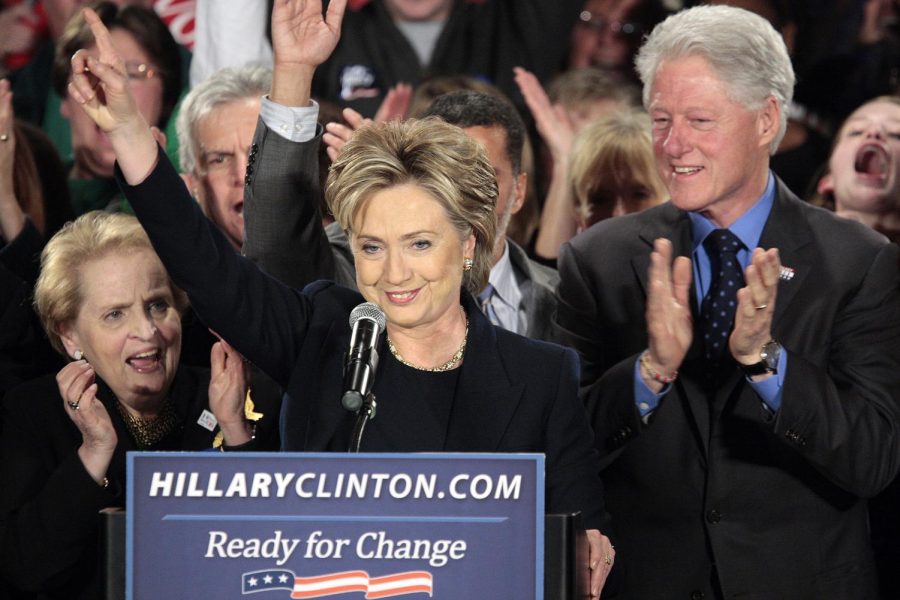Female Professors discuss Clinton’s pull to young voters
Democratic presidential hopeful, Sen. Hillary Clinton, D-N.Y., and her husband, former president Bill Clinton, speaks to supporters at her caucus night party Thursday, Jan. 3, 2008, in Des Moines, Iowa.
In terms of policy and the possibility of becoming the first female US president, Hillary Clinton’s campaign is unique. Despite her first attempt at the presidency in 2008, it may be an over assumption to believe that Clinton is running on the same plane as other presidential candidates throughout history.
“I think we’ve presumed that she’s in friendly territory and it’s pretty clear she’s not,” said Dr. Suzanne Holt, Director of Women’s Studies.
As the only female candidate in the 2016 election, Clinton has caused political analysts to become hyper-aware of her actions regarding women’s rights. This, however, makes it easy to stereotype women as acting or thinking a certain way when voting, which is something Dr. Susan Kunkle, Assistant Professor in the Department of Sociology, believes shouldn’t be the decisive factor.
“In terms of women as a voting block, I don’t think men or women are necessarily monolithic. I think women who view Clinton, or Sanders, or Trump, or anyone else running will be looking not so much at gender, although some will, but will be looking at the policy preferences,” Kunkle said.
With a distinct focus on actions and policies regarding women, Clinton has faced a good share of criticism. One such issue is the Clinton Foundation, founded by husband and former president Bill Clinton, which received donations from countries whose standard for women’s rights do not meet those of the United States.
“If those countries that themselves are not doing the kind of things that we’d like them to be doing for women’s rights are willing to give up their money to support an organization that is, I don’t have a problem with that at all,” said Dr. Pamela Grimm, Associate Professor and former adviser of the College Democrats.
Although not exclusively a women’s rights issue, another remark of Clinton skeptics is that she has not always been in support of same sex marriage.
“I think that the issue of same sex marriage was initially even divisive in the LGBTQ community. I think that it’s funny how culturally we’ve come to accept that there’s a right and a wrong answer, but I think it takes time for us to weigh things and I think that it’s fair to allow people to weigh things and I think it’s really fair and maybe wise to allow people to change their minds,” Holt said,
Clinton, like many of the other candidates, has had to address campaign finance and the number of banks and corporations funding her campaign. Many wonder how she can represent the needs of the American people when she is also tied to such powerful interest groups.
“I think that campaign funding in general is problematic for a lot of candidates,” Kunkle said.
Millennials may criticize Clinton because of ideological and policy changes she’s made during her political career.
“I feel like she’ll drag this country down, I feel like she doesn’t have any consistency in her life, I feel like she changes her opinions based on what’s popular,” said Lexi Zetts, a Bio Pre-Med for Dentistry major.
Despite these changes causing scrutiny, it could result in governmental changes that such millennials are seeking. In a primary season that has been nothing but surprising, Clinton’s significant re-evaluations may benefit her campaign when all is said and done.
“I think campaigning against Bernie has helped her understand why it is important to listen to young people in the United States,” Grimm said.
For more information on Clinton’s campaign and policies, visit https://www.hillaryclinton.com/



